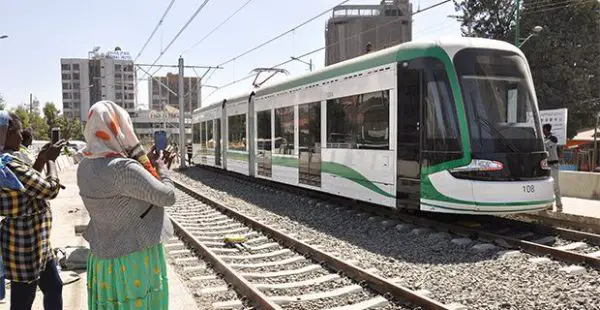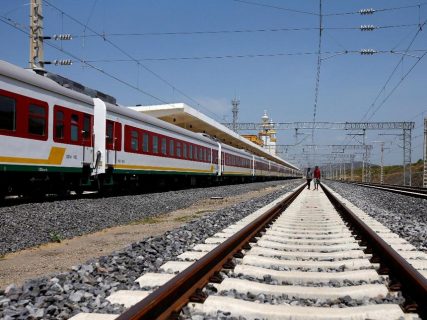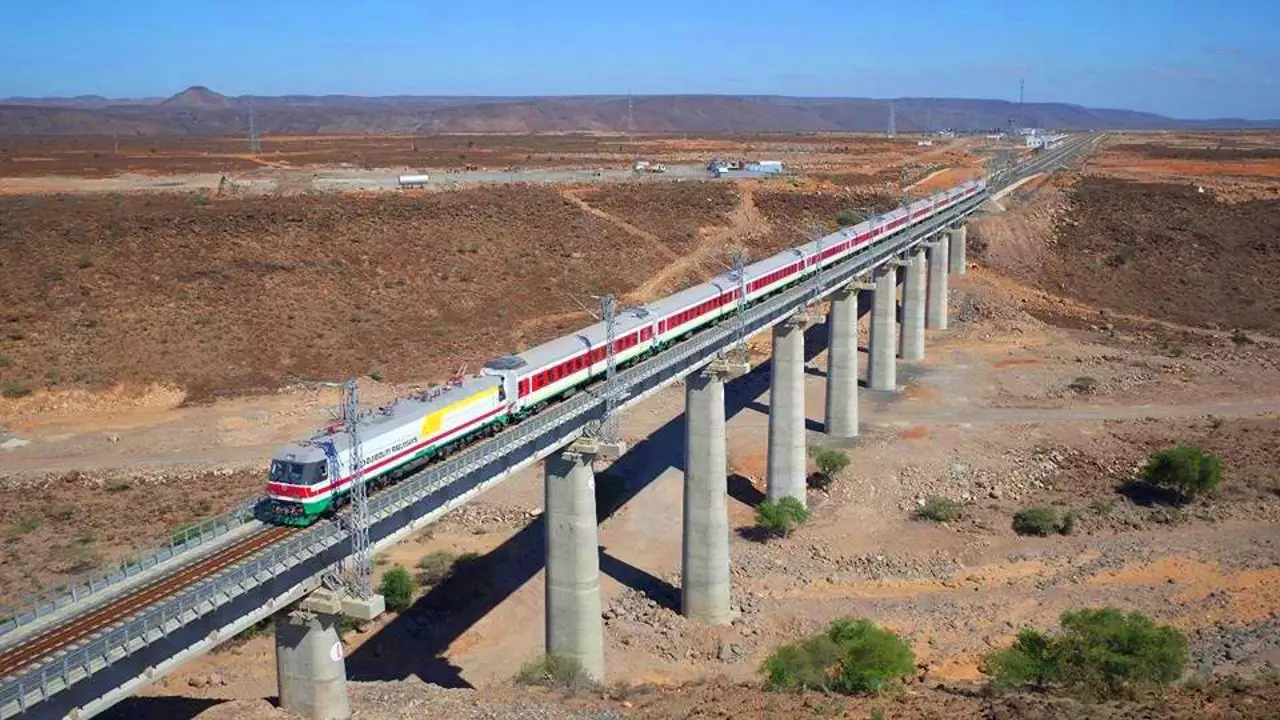The Addis Ababa-Djibouti Railway is a modern standard gauge railway that forms the spine of the Ethiopian National Railway Network. The line was first opened back in 1917 as a meter gauge railway before its stakeholders embarked on a modernization project that began with a pre-feasibility study conducted in 2007.
The construction works were carried out in the following years. They involved laying a double track for the first 115km from Addis Ababa to Adama, and a single track for the remaining 600km to Djibouti. As part of the project, a total of 21 stations were also built as and equipped with a prayer room, ticketing, and refreshment facilities.
Prime Minister Hailemariam Desalegn opened the railway, which has a total of 61 bridges, 37 frame bridges, and 453 culverts on January 1, 2018. It connects Djibouti’s Port of Doraleh with Addis Ababa, Ethiopia’s capital, giving the landlocked country access to the sea.
The governments of Ethiopia and Djibouti share ownership of the railroad. The railroad part in Ethiopia is owned by the government-owned Ethiopian Railway Corporation. In order to run the railroad, a binational public company with its headquarters in Addis Ababa called the Ethio-Djibouti Standard Gauge Rail Transport S.C. was established in 2017. It is owned by the governments of Ethiopia (75% share) and Djibouti (25% share). Ethiopia holds the CEO position and is represented by its minister of transport.
Reported on Feb 4, 2017
US$4b newly constructed Djibouti-Ethiopia railway set for testing

A new railway line-Djibouti-Ethiopia- that links the capital Addis Ababa and Djibouti is now ready for testing, officials have said.
The US$4b Djibouti-Ethiopia railway line, funded primarily by China is meant to boost transport in the region and by and large the economy.
Officials with Ethiopian Railway Corporation say trial service will run for three to six months on the line, beginning the first week in October.
The electric rail system will cut travel time between Ethiopia’s landlocked capital and the Port of Doraleh, on the Gulf of Aden, from two days to less than 10 hours. It is part of an ambitious Ethiopian initiative to build 5,000 kilometers of rail to connect its fast-growing cities and their markets.
That $3 billion vision would make Ethiopia the first sub-Saharan country outside of South Africa to develop a comparable national rail network.
China’s funding of 70 percent of the Addis Ababa-Djibouti line reflects its continued investment and strategic interest in the Horn of Africa.
The railway is built by China Railway Engineering Corporation (CREC) and China Civil Engineering Construction (CCECC) and replaces a nearly 100-year-old diesel line with efficient, environmentally friendly new trains.
The move to boost railway transport in Ethiopia is meant to keep the economy expanding at the rate of 8 percent. Ethiopia seeks to become an African manufacturing center, offering investors efficient transport, cheap power, and efficient labor.
Ethiopia like any other African country is struggling to boost its transport system at a time when it is trying to industrialize.
Kenya is putting up a multi-billion shillings standard gauge railway connecting Mombasa and Nairobi. The railway system is meant to boost the economy of the country once complete.
Reported on Jan 10, 2017
Official completion of 752Km Addis Ababa-Djibouti Railway announced

The construction of the first electric Standard gauge Railway line in sub-Saharan Africa has been officially completed with a colorful ceremony at Nagad Railway Station in Djibouti.
The Addis Ababa-Djibouti Railway railway will link Ethiopia’s capital with the Port of Djibouti and ease the transportation of goods in the area.
The event was graced by Djibouti’s President Ismail Omar Guelleh and Ethiopia’s Prime Minister, Hailemariam Desalegn, and some of the senior officials from both governments.
The railways are expected to reach a maximum speed of 160 km/h for passenger trains and 120 km/h for cargo trains. It will cut cargo journey times between the Port of Djibouti and Addis Ababa from three days by road to just 12 hours.
Trial services for the new US$4.2 billion railway began in October 2016, with regular services transporting goods and passengers expected to begin early this year.
According to Djibouti’s President Ismail Omar, this was a great achievement for both countries as it will enhance trade and above all raise the economic status of the two countries which have been enjoying good working relationships.
“The railway is a major milestone in the region as we expect to have a better working relationship between the two countries and we expect to carry on more projects that will enhance economic growth in between the countries” he added.
Currently, more than 90% of Ethiopia’s trade passes through Djibouti, accounting for 70% of the overall activity at Djibouti’s ports. With Africa’s GDP predicted to double by 2035, and the population expected to reach 2.5 billion over the next 30 years, the continent is in need of major new infrastructure links.
This is one of the biggest projects that has been carried out by the two countries and they agreed that they will hold talks over the possibility of having a joint road connecting the two borders.
Reported on Feb 7, 2014
Djibouti’s US$4.5 billion railway project launched
Ethiopia’s, Prime Minister, Hailemariam Desalegn, and Djibouti’s President Ismail Omar Guelleh have launched construction of the new Nagad Railway Station. Construction of the station, which will form part of the 800km Addis Ababa – Dewele – Djibouti route, was also inaugurated in the presence of Ethiopia’s Minister of Foreign Affairs, Dr. Tedros Adhanom.
Following the groundbreaking, Prime Minister Hailemariam stated that the Addis Ababa-Djibouti Railway will have a significant impact on the region, namely in bolstering regional economic integration. Similarly, President Guelleh said the infrastructure will advance economic cooperation and social connections between the two sisterly countries. Both leaders described the occasion as a historic day for the region.
On his part, Dr. Tedros explained that the US$4.5 billion Addis Ababa-Djibouti Railway project exemplifies Ethiopia’s foreign policy which aims to fight poverty and build a prosperous nation and region. He went on to explain that the costs of the massive rail project would be shared by both governments and that, on the Ethiopian side, 20 percent of the construction had already been completed.
He expressed his happiness that everything was ready on the Djiboutian side, including all necessary equipment, in order to begin construction of the Nagad Station.

